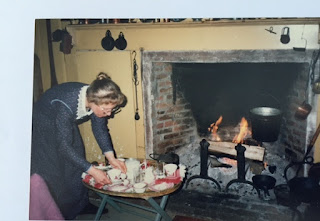Sitting near Tasha’s Fireplace
The
thermometer at my barn registered two degrees this morning, a cold temperature
for farm, located where the breath of Lake Michigan warms our air. Sunshine
shimmers on the paths cut through the many inches of snow that fell last week.
Because most of my visits to Tasha took place before my family headed into
maple sugaring season, I associate frigid temperatures and mountains of snow
with Vermont.
Frosty
lace patterns spread across Tasha’s windows, especially in those upstairs
bedrooms farther removed from the cook stove and fireplace. Out of doors, each
step squeaked on the icy snow when I walked Tasha’s driveway so that I could
fetch her mail. Sometimes a fine mist of snow blurred the edges of the wood,
limiting the view, but most days the sunshine glittered on the snowy caps
decorating tree limbs, or on the undulating, snow-covered forest floor. A red
scarf swathed my face in order to filter some of the cold before the air flowed
to my lungs. While the trek resulted in numb toes, the joy of Tasha’s fireplace
waited for me.
If
a constant fire hadn’t been burning in the Rumford fireplace, a man could have
stepped inside it and looked up through the brick chimney. First thing in the
morning, Tasha would stir the embers, add a few birch bark logs that quickly
flamed, and then add oak or other hardwood that would burn for hours. When I
emerged from the canopy bed, leaving behind a nest of the featherbed and quilts,
I slipped into my coat, hauled in armloads of wood, and deposit them on the
hearth. Throughout the day, either Tasha or I would poke at the fire, add
another log, and revel in the heat. And like a final blessing, each night Tasha
banked the fire so that it could sleep through the night and be revived at
sunrise.
Once
while watching sparks dance up the back of the fireplace, Tasha brought up the
folklore connected with the sight. She and her brother had called the sparks
British soldiers because they reminded them of the Redcoats. No such tradition
lingered from my childhood, only the memories of flushed cheeks and wood smoke
clinging to my hair.
When
the discussion traveled on to how others loved her fire, Tasha confided, ““Often
when I invite someone for tea, the fire mesmerizes them, their faces grow
dreamy, and they are hesitant to depart. Usually, I can shoo them away by announcing
it is time to milk the goats and attend to the evening chores.”
Thankfully,
I was privileged to draw my chair closer to Tasha’s fire, to listen to her
stories, learn from her wisdom, and bask in the warmth of her friendship.
